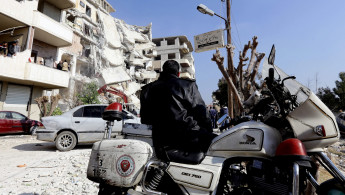Unanswered questions over the assassination of Samir Kantar
Unanswered questions over the assassination of Samir Kantar
Israel almost certainly did kill former Lebanese prisoner Samir Kantar despite Tel Aviv predictable reticence, and now the region waits to see Hizballah's response, amid reports of a Russian role.
3 min read
Israel welcomed the death of Lebanese national Samir Kantar [AFP]
On Saturday night, Israel is thought to have perpetrated a new assault in Syria, assassinating former prisoner Samir Kantar whom it had previously detained for 30 years.
Kantar, after his 2008 release and until his death, handled military functions in the ranks of Lebanese militant group Hizballah.
It is not clear what his role in Syria was.
Syrian state media suggested that he was part of a major offensive that took place in Qunaitra earlier this year.
He was also involved in the defence of a Syrian air base near the Druze-majority region Suweida, if some reports are to be believed, after rebels launched an offensive to capture it.
On September 8, 2015, US Executive Order 13224 made Kantar a specially designated global "terrorist" due to his links with Hizballah.
Kuntar was also charged with helping to establish a militia to resist Israeli occupation in the Golan Heights.
His murder is a huge blow to Hizballah, given his present role and history in fighting Israel before he was captured in 1979, when he took part in an operation in occupied Palestine with a Palestinian resistance group.
However, the most recent Israeli strike in Jaramana, Syria, raises many questions.
Given the heavy Russian deployment in Syria, complete with advanced anti-aircraft systems, and what we know about Russian-Israeli military coordination in Syria, the question is this: Did Russia know of or consent to the Israeli strike that took place very far from the flashpoints in the occupied Golan Heights?
Hizballah's awaited response
Hizballah is likely to be planning a response in line with what happened when Israel killed several Hizballah operatives and an Iranian commander in January.
Israel seems to be preparing for this scenario, with bomb shelters readied on Sunday evening as four rockets were fired into northern Israel from Lebanon, though judging by their crude nature they do not seem to have been launched by Hizballah.
Hizballah Secretary General Hassan Nasrallah is scheduled to speak Monday evening, and he might address the assassination of Samir Kuntar and Hizballah's possible response.
Hizballah's official obituary of Kantar aknowledged his military role alongside the Syrian regime and Hizballah in Syria, where the Lebanese group has been fighting for three years now.
Conflicting accounts
Even though there have been conflicting reports regarding how Kantar was killed, Israel's doctrine of targeted killing makes it very likely that the Israeli air force was behind the killing, which also claimed the lives of other officers and civilians.
In 2008, Kantar and other Arab prisoners in Israel were swapped for the bodies of Israeli soldiers killed by Hizballah. He had been convicted in Israel for the killing Israelis, though Kantar denied some of the charges.
Kantar's death is the latest in a long line of Israeli assassinations of Hizballah officials over recent years.
In February 2008, Israel killed Imad Mughniyeh in Syria. In December 2013, an Israel-linked squad gunned down senior Hizballah commander Hassan Lakkis.
In January 2015, an Israeli airstrike killed Jihad Mughniyeh, Imad's son, in addition to five Hizballah fighters and an Iranian Revolutionary Guards general.
Hizballah is likely to be planning a response in line with what happened when Israel killed several Hizballah operatives and an Iranian commander in January.
Israel seems to be preparing for this scenario, with bomb shelters readied on Sunday evening as four rockets were fired into northern Israel from Lebanon, though judging by their crude nature they do not seem to have been launched by Hizballah.
Hizballah Secretary General Hassan Nasrallah is scheduled to speak Monday evening, and he might address the assassination of Samir Kuntar and Hizballah's possible response.
Hizballah's official obituary of Kantar aknowledged his military role alongside the Syrian regime and Hizballah in Syria, where the Lebanese group has been fighting for three years now.
Conflicting accounts
Even though there have been conflicting reports regarding how Kantar was killed, Israel's doctrine of targeted killing makes it very likely that the Israeli air force was behind the killing, which also claimed the lives of other officers and civilians.
In 2008, Kantar and other Arab prisoners in Israel were swapped for the bodies of Israeli soldiers killed by Hizballah. He had been convicted in Israel for the killing Israelis, though Kantar denied some of the charges.
Kantar's death is the latest in a long line of Israeli assassinations of Hizballah officials over recent years.
In February 2008, Israel killed Imad Mughniyeh in Syria. In December 2013, an Israel-linked squad gunned down senior Hizballah commander Hassan Lakkis.
In January 2015, an Israeli airstrike killed Jihad Mughniyeh, Imad's son, in addition to five Hizballah fighters and an Iranian Revolutionary Guards general.



